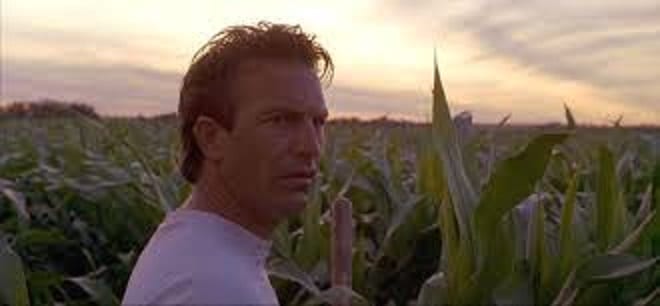Jeanne and I are great lovers of movies. As I have described in this blog on several occasions, my all-time favorite movie is “Dead Poet’s Society;” Jeanne’s is “Chariots of Fire.” But a different movie that appears on both of our “top ten” lists—a movie that I am thinking of frequently these days as politicians seek to attract the attention and support of the good citizens of the heartland—is “Field of Dreams.”
The story is familiar to most everyone—pure magic with Kevin Costner, James Earl Jones, Burt Lancaster and Ray Liotta in an Iowa corn field. Toward the end of the movie, as Ray Kinsella begins throwing a baseball with his father who died years earlier and who Ray had rejected long before that. John Kinsella asks “Is this heaven?” “No,” Ray replies—“It’s Iowa.” Every four years, Iowa is a place where the dreams of Presidential hopefuls come either to die or to live until the next primary, but the Iowa of “Field of Dreams” is a place where, at least for a time, the dividing line between this world and what lies beyond is blurred.

Joan Chittister tells the story of another case of mistaken identity. On a busy Manhattan street, hundreds of people per minute rush by a young woman’s fruit and vegetable stand; her daily business depends on her produce being attractive enough as a quick lunch or snack to draw people away from their focused and determined travels to their next destination. Suddenly, everyone heard the crash. The produce stand teetered for a moment, then the baskets containing apples, oranges, pears, tomatoes and peppers fell off the stand onto the sidewalk. They rolled in every direction, under the feet of pedestrians and toward the sewer grates along the street. The girl behind the stand burst into tears, fell to her knees, and began to sweep her hands as far as she could reach in an attempt to gather in her produce. “What am I going to do?” she wailed. “It’s all ruined! I won’t be able to sell any of this!”
One man, rushing by with a few colleagues on his way to a meeting a few blocks down the avenue, upon seeing her distress stopped and came back. “Go on—I’ll catch up with you!” he shouted to his companions. He got down with the young woman on the sidewalk and started retrieving what produce he could. It was only then, as he watched her sweep her hands across the sidewalk in every direction with her face pointed upward, that he realized the young woman was blind. “What am I going to do?” she kept crying.
After returning her cart to an upright position and putting the items he had been able to collect back in their baskets, the man took forty dollars out of his wallet and pressed it into her hand. “Here is forty dollars to pay for the damage,” he said as he prepared to go. The girl stood up and reached in the direction of where she had heard his voice. “Mister,” she called out after him—“Mister, wait!” He turned around, returned to where she was standing, and looked into her blind eyes. “Mister,” she asked, “are you Jesus?”
Chittister doesn’t reveal the man’s answer to the question, but I know what mine would have been. Assuming, of course, that I had been good enough to stop and help the woman while hurrying from one place to another. I’d like to think that I would have helped, but the truth is that Jeanne is far more likely to have immediately gotten on her hands and knees to help and would have dragged me down to do so as well. My answer to the “are you Jesus?” question would have been first to laugh, then say something like “no, that’s well above my pay grade!”
The blind woman’s question is understandable—this is the sort of thing that one can imagine Jesus doing, regardless of whether one is a Christian. But we forget that all we have of what Jesus was like are vignettes, bits and pieces of the sorts of things the guy and his entourage were up to for three years as they wandered the countryside and towns. It is very possible that the gospels are a “greatest hits” sort of account; stories of the undoubtedly many times Jesus walked by someone in need or failed to recognize a person in distress aren’t likely to sell very well or generate many followers over the generations. But even in the gospels we occasionally catch glimpses of Jesus in a hurry, Jesus worn out by the crowds, and Jesus having a bad day.
The young woman’s “Are you Jesus?” question is not inspired by a miracle performed or an eloquent sermon delivered—she asks because the man who helps is doing the sort of thing that human beings do when they are at their best rather than in a rush, self-absorbed, or unaware of what is right in front of them. In her mind “Jesus” is the name for the best that a human being can be. That is definitely not above my pay grade.
Within the context of my Christian faith, helping those in need is not only within my pay grade, it is according to the gospels a requirement of my faith. According to the texts, the one guaranteed way to piss God off is to fail to pay attention to the poor, widows, homeless, orphans, and all those who have fallen through the cracks. To be a follower of Jesus is, by definition, to be a person who is on the front lines of aid and protection for the less fortunate.
This is more than a moral directive—it is the direct outcome of the Christian story of Incarnation. God in human form, the divine clothed in mortal flesh—this is the heart and soul of the Christian faith and it how God continues to be present and work in the world. God made flesh is not just a moment in time that we celebrate two millennia later. As Chittister points out, the created world in which we live can only be completed when we take ownership of the divine within us and act accordingly.
God did not finish creation; God started it. Its ongoing development God leaves to us. What we do in life makes us the hands of God in living flesh and blood. Having made the world, having given it everything it needs to continue, having brought it to the point of abundance and possibility and dynamism, God left it for us to finish. God left it to us to be the mercy and the justice, the charity and the care, the righteousness and the commitment, all that it will take for people to bring the goodness of God to outweigh the rest.
Sister Joan closes the story of the blind young lady with the shocking, but empowering truth;
Are you Jesus? people ask us silently every day. And the answer formed in us if we live it with constancy, with regularity, with fidelity, is surely, yes.













